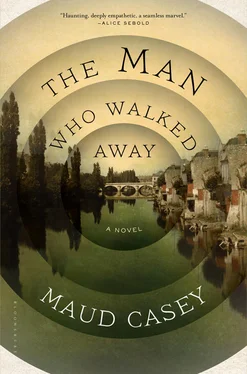Someone comes. His father’s pocket watch ticks in his hand with his pulse, ticking the blood through his veins. “There is time enough,” his father said. But a few days after his father gave him the watch, it stopped. His mother took him with her to a jeweler, who, over the boy’s protests, took the back off of the watch. “What are you afraid of?” his mother asked, scolding him out of embarrassment. How could he explain that he was worried the jeweler would steal the watch’s magic? The jeweler was very kind and, seeing his fear, explained each step—“and now I’m unscrewing the screws, and here’s the pinion and the pallet and the mainspring, see, there’s dirt gummed up in there. It will only take a little cleaning”—and the jeweler had the watch ticking again. And those intricate tiny mechanisms inside the watch! “Beautiful,” the jeweler said. “Look how beautiful that is!” And it was. The same as with every new patient — inside, somewhere, waiting to be discovered: beautiful, intricate mechanisms.
Someone comes . . The Doctor can’t remember the rest. There is salt on his tongue from the gust of wind blowing through an open window into the long hall. Outside, Marian’s red flower, its knot waiting to be undone, sways in the garden.
“His name,” Nurse Anne says, “is Albert.”
At the sound of his name this man, Albert, turns. His face sags with the familiar exhaustion of all of the other patients, but there is something else too. Something of his own, waiting to be discovered.
Someone comes .
“It’s not a happy story,” Albert says, looking at the Doctor.
It never is. Still, in this man’s eyes, the Doctor sees it: an invitation.
PART TWO. Albert Observed
Muss es sein? muss es sein?
Es muss sein!
For years, the man walking along the Weisse Elster River was a secret in the violinist’s heart. He told no one as he obsessively pursued Beethoven’s notoriously difficult sixteenth string quartet, completed only months before the composer’s death. If he could, the violinist would play it all day and all night; he would never stop. It is all he thinks about and all he ever wants to think about. It is not mere mastery he is after. He wants to play the way that man walked; even as he was walking, it was as if he had arrived.
“Do you think I worry about your lousy fiddle when the spirit moves me?” Beethoven once said to a violinist who complained of the difficulty of the final movement, the one he titled “The Difficult Decision.” Res severa est verum. True pleasure is serious business. Seneca’s words engraved in the Gewandhaus, the first concert hall in Leipzig. True pleasure has made the violinist’s fingers bleed; it has given him a permanent ache in his back; it has marked him with a raw spot under his chin that will never heal. What the violinist has learned is that true pleasure is always just up ahead on the horizon. He will never achieve his desire. The truth about true pleasure is that it’s not all that pleasurable. He doesn’t care. There is something in the effort — like the walking man, not quite there and yet still arriving — and so the violinist will keep trying.
Must it be? Must it be?
It must be!
“But you were there ,” Marian says, holding the metal watering can to her chest like a shield. “In the billiard room, with him. You have nothing to offer?”
It’s true, the veteran was there in the billiard room with the new patient, but now he is here, digging and digging and digging. He would prefer to be left alone where he is, in the present. He doesn’t like to live backward. He is trying to break that habit altogether; it leads him into deep holes, as deep as the one he is digging. He is a terrific digger. I am a terrific digger. He says this to himself, in his head, to fend off other thoughts. Digging is the task the Director has assigned him in this vegetable garden planted in the corner of the courtyard where it will get the proper sun, and digging is the task the veteran is keeping at the forefront of his mind. Since the Director entrusted him with the trowel, the veteran has not had one violent thought, not one moment of wanting to point the trowel at Marian, to poke at her watering can, to slip the trowel behind the watering can and cut her just a little because she will not stop asking him to think in the wrong direction. I am a terrific digger. I am a terrific digger. I am digging, I am digging. I am digging. Terrifically.
Thick clouds obliterate the sun, and Marian sheds her hat and veil. She feels not just optimistic but triumphant in the security of her organs, which, this morning at least, are all accounted for. “Mist,” Marian declares, “is my favorite weather.”
“Make sure to water evenly,” the Director calls over from where he squats to examine a carrot, sniffing the dirt-clumped roots. “Very good!” he calls to the veteran. “Very good.”
The veteran digs and digs and digs. It causes a steady ache in his arm that matches the one in his back as he bends. The aching helps him not to think about the fact that he is thinking. I am not thinking. I am digging. He is not thinking, for example: If I dug a hole deep enough I could crawl inside. I could tunnel into the earth . If only he could disappear along with the image that surges up in him when he is not not thinking hard enough of his brother’s chest rising and falling behind him on the battlefield as he ran until his brother’s chest didn’t rise and fall anymore, until his brother was swallowed by the earth. The veteran is not thinking, for example, Why am I here now and my brother is not? He is not thinking, My brother is in the ground where I am digging and digging. Three yellow birds hop along a nearby bench, chirping, Brother, brother , and he would like to shoot them with a gun that isn’t fucking imaginary.
“Step gently,” the Director cautions Marian as she weaves through the rows of kale and lettuce, dribbling water here and there as she approaches the veteran on his knees next to a row of triumphant beans. Even the beans are triumphant this morning!
The small vegetable garden has been a success this year. “Amazing,” the Director says, “that it dies and then comes alive again. Over and over.” He said this last year too, and last year it hadn’t come alive at all. But this year the garden pushes up out of the rich horse manure delivered by the owner of a nearby stable, a man whose brother was once a patient at the asylum.
“Well?” says Marian, standing next to the veteran. With her toe she nudges dirt back into the hole he has made.
“Marian,” the Director says sternly, “leave it alone.” Thinking the Director means him, Walter stops squeezing a not-quite-ripe tomato on the trellis.
The veteran looks up at Marian but— Brother, brother , chirp the demon birds done up in bright yellow as if nothing is wrong. He must return to his digging.
Marian is only trying to get the veteran to help the expectant shimmer, in the air since the new patient’s arrival last night, to take shape. Nurse Anne claims the man is sleeping, that he needs his rest, but this morning Marian saw it. A phantom figure out of the corner of her eye as she sat on her bench underneath the stained-glass Jesus glittering red, blue, and yellow. She has lived for too long surrounded by the unknown — room after room of it; there is no more room for it in her world. There is such a thing as too much unknown. That someone is here among them, unknown to her, makes her restless.
Читать дальше












